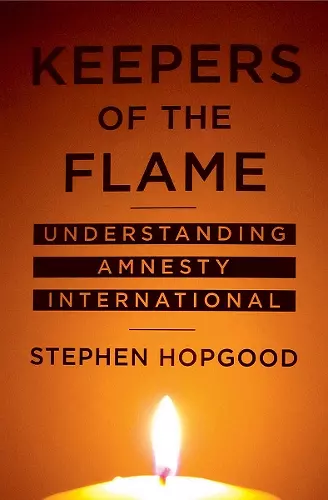Keepers of the Flame
Understanding Amnesty International
Format:Hardback
Publisher:Cornell University Press
Published:15th Apr '06
Currently unavailable, and unfortunately no date known when it will be back
This hardback is available in another edition too:
- Paperback£24.99(9780801472510)

"If one organization is synonymous with keeping hope alive, even as a faint glimmer in the darkness of a prison, it is Amnesty International. Amnesty has been the light, and that light was truth—bearing witness to suffering hidden from the eyes of the world."—from the Preface
The first in-depth look at working life inside a major human rights organization, Keepers of the Flame charts the history of Amnesty International and the development of its nerve center, the International Secretariat, over forty-five years. Through interviews with staff members, archival research, and unprecedented access to Amnesty International's internal meetings, Stephen Hopgood provides an engrossing and enlightening account of day-to-day operations within the organization, larger decisions about the nature of its mission, and struggles over the implementation of that mission.
An enduring feature of Amnesty's inner life, Hopgood finds, has been a recurrent struggle between the "keepers of the flame" who seek to preserve Amnesty's accumulated store of moral authority and reformers who hope to change, modernize, and use that moral authority in ways that its protectors fear may erode the organization's uniqueness. He also explores how this concept of moral authority affects the working lives of the servants of such an ideal and the ways in which it can undermine an institution's political authority over time. Hopgood argues that human-rights activism is a social practice best understood as a secular religion where internal conflict between sacred and profane—the mission and the practicalities of everyday operations—are both unavoidable and necessary. Keepers of the Flame is vital reading for anyone interested in Amnesty International, its accomplishments, agonies, obligations, fears, opportunities, and challenges—or, more broadly, in how humanitarian organizations accommodate the moral passions that energize volunteers and professional staff alike.
Hopgood has done the organization, the global human rights movement, and other stakeholders and important service by getting inside Amnesty and revealing its internal culture. For movement insiders, Hopgood's book provides... insight into what holds the movement together as well as what tends to divide it. For outsiders, his book offers a penetrating portrait of an improbably but indispensable organization.
* Human Rights Quarterly *Hopgood spent a year in Amnesty's International London headquarters, the International Secretariat, interviewing staff and researching the inevitable bureaucratic and philosophical challenges facing the well-known humanitarian organization. This is an interesting, ambitious, and lucid critique of the International Secretariat.
* Choice *Hopgood's unique study of Amnesty International is a welcome contribution from a political scientist with anthropological instincts, and it is likely to become a classic in the field. Hopgood immersed himself for over a year in Amnesty's culture, rituals, and politics, and then interpreted this data with insights from Emile Durkheim and Pierre Bourdieu. He writes clearly and well, and his interpretations should appeal to students of transnational organizing, human rights, and international affairs, broadly conceived.... For students of international organizations, one of the book's most intriguing elements is the author's representation of the Amnesty employee experience.... As Hopgood's book makes abundantly clear, it is devilishly difficult to build a representative, transnational movement for justice, even with the best of intentions.
* Perspectives on Politi- Winner of Winner of the Best Book Award in Human Rights (Hum.
ISBN: 9780801444029
Dimensions: 229mm x 152mm x 22mm
Weight: 907g
272 pages